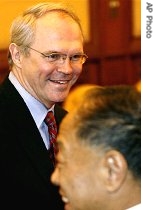2006年VOA标准英语-US Envoy Extends Stay in Beijing for North Kore(在线收听)
By Kurt Achin
Beijing
20 December 2006
Washington's chief delegate to multinational talks on ending North Korea's nuclear weapons capabilities has agreed to extend his stay in Beijing for more discussions than previously scheduled. The United States and its regional partners are focusing on the specific steps each nation needs to take to bring to fruition Pyongyang's promise to denuclearize. VOA's Kurt Achin has more from Beijing, where the talks are taking place.
 |
| Christopher Hill, left, walks past Chinese Foreign Minister Li Zhaoxing, right, during a meeting in Beijing, 20 Dec. 2006 |
"The discussions for us have been very useful in the last day, day and a half. I think it's worth our while to continue on this," he said.
China, Russia, the United States, South Korea and Japan are meeting here for a sixth formal time in three years to try to persuade North Korea to live up to its pledges to be nuclear-weapons free, in exchange for financial and diplomatic benefits.
Hill said he was far more optimistic Wednesday than on Monday, the opening day of the talks, when North Korea declared itself a nuclear power and demanded all United Nations and United States sanctions against it be lifted.
"I felt when we started Monday morning - to be frank, Monday was kind of a difficult day - and the idea that I'd still be here Wednesday night telling you it was useful to continue - I frankly didn't think I would be saying that," he said.
In September of last year, North Korea signed an agreement with the five nations in which it agreed in principle to dismantle its nuclear capabilities within a framework of dialogue and cooperation. Hill says the focus of this week's talks is finding real steps Pyongyang can take to actually implement that promise.
"Certainly, we are talking about much more than agreeing on things on paper, we're discussing actual developments on the ground," he added.
Hill declined to provide details at this point about what those steps may be. However, experts say they may involve Pyongyang freezing its main nuclear reactor, in exchange for certain security guarantees by the United States. North Korea has long based its pursuit of nuclear weapons on its perception of a "hostile attitude" by the United States. Washington says it has no plans to attack the North.
Hill says what is important is for the process to be set in motion soon.
Hill: "It's requiring people to do things within specific amounts of time."
Achin: "What kind of specific amounts of time?"
Hill: "We think things should get under way within... boy, do I want to give a date. No, I'm not going to give you a date."
Achin: "A year?"
Hill: "No, it's a lot shorter than a year."
One of North Korea's key demands is an end to financial steps Washington says it took to protect its banking system from money laundering and counterfeiting by Pyongyang.
Senior U.S. Treasury Official Daniel Glaser said Wednesday the talks he has held with his North Korean counterparts on the sidelines of the six-party negotiations were "businesslike and useful." Glaser planned to return to Washington Thursday, but says the two delegations may meet again next month in New York.